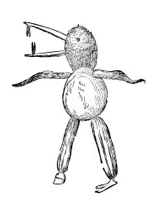On our field trip we sing—as every child
of these cities does— نسم علينا الهوا, and Miss Sahar
and the bus driver sway along to Fairuz. A war
engulfs nearby Beirut, shredding its portrait andshipping its refugees across the Mediterranean
but we sing, as Fairuz does,
we eat our labneh sandwiches and sing.
At Hadrian's Arch, Miss Sahar charges ahead,
never more alive than among these stones.
Swathes of wild mustard crowd
at the trunks of Jerash's rumis, school girls
at the feet of stately elders, speckling verdure with gold.
Miss Sahar gestures at the salvaged city,
at granite and limestone somnolent
in March light. Bypassing Zeus
and his cluttered temple, clopping
the cobblestones of the forum, she stands in full sun
at the center of the ancient road, waves
away tour guides. The Cardo runs North-South;
behind us, Amman. She faces the vanishing
point and says "el-Sham,"
our polaris of language and perfume.
I'm entangled in origin stories, I hear the pulse
of one word nesting in the womb of another,
so that when without irony, she says
"and to the West, Palestine," our ancestry
is once and eternally a sunset and an estrangement.
"And to the east, Baghdad," the ق of her sharq
crackling in the parched air.
Were we ever listening, as she conjured
the wars we would endure or succumb to, the spring
that would rise up and swelter, the cities
we would march through or flee from, cities
that would bury us or let us,
each one alone,
watch them burn
on screens so small
we held them
in our hands?



